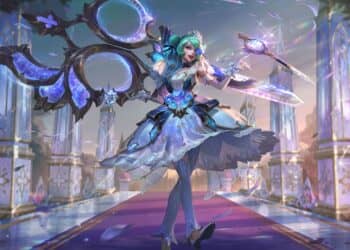God of War’s first main series installment in eight years has changed Kratos just as much as the gaming landscape. Older and wiser, Kratos leads an adventure unlike anything he’s experienced before. Santa Monica Studios have moved with the times by delivering an engaging and thoughtful title which doesn’t just reinvent the series on the PS4; it sets a new standard for action-adventure games.
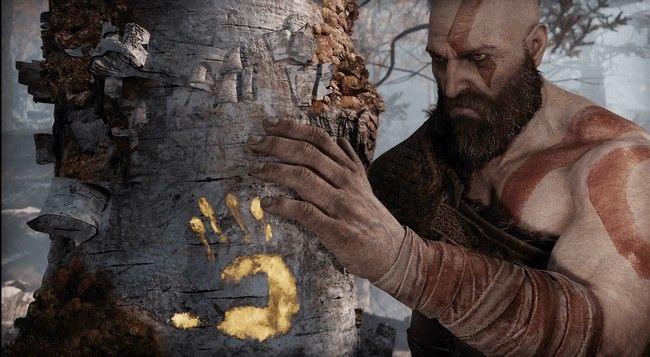
God of War is quick to thrust us into the action. We wander the cold caverns around Kratos’ home witnessing brief, tense exchanges with his son Artreus. We observe the two have remarkably little in common, but one thing in particular. That’s the pre-game death of respective wife and mother, Faye.
The dying wish of their loved one sets Kratos and Artreus on a journey to spread her ashes from the highest peak in the realm. It’s an refreshingly understated objective. We aren’t saving the world. We aren’t battling an evil overlord. We aren’t out for revenge. In the grand scheme of things their goal makes no difference. And yet somehow it fits better than the clichéd motivations we’ve played through a hundred times. God of War is really about the journey, not the destination.
From the opening scene of Kratos chopping down a tree, our immersion never fades. God of War phenomenally retains a single, rolling shot for the entire game. There are no cut-scenes and no loading times. Even fast travel employs a rather ingenious method of sparing us a black screen, which I won’t spoil. The third-person camera may initially feel a few yards too close to the action, but it’s just another way of placing us firmly in Kratos’ shoes. Director Corey Barlog wanted to create a more personal feel for the player with these elements, and boy he succeeded. The only offence punishable with a loading screen is allowing Kratos to fall in battle.
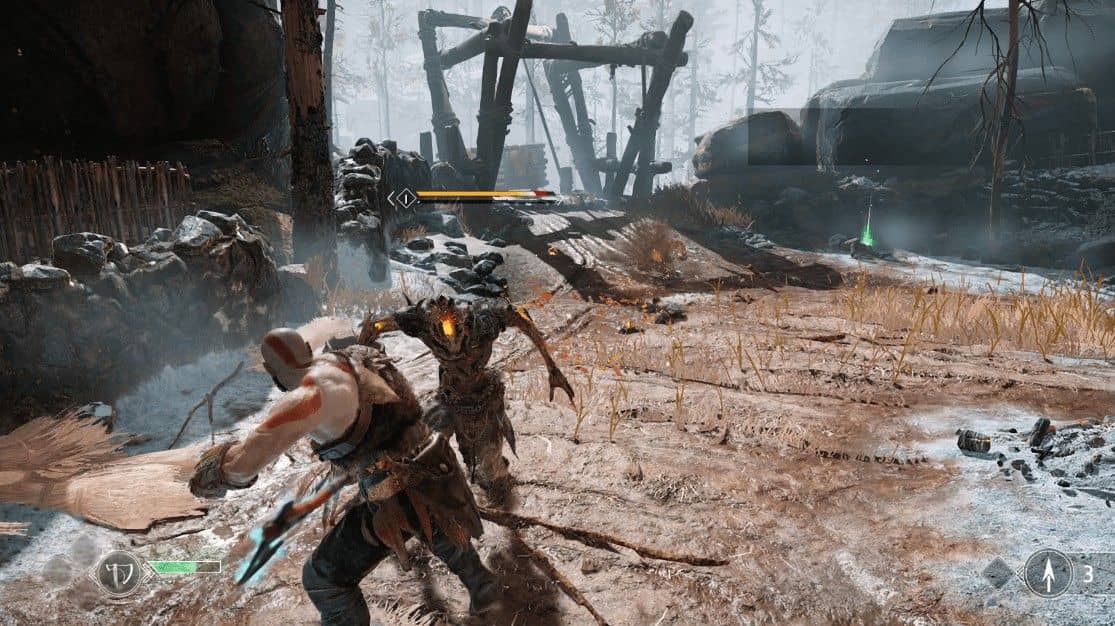
Speaking of battles, Kratos – armed with his trusty Leviathan Axe – is ridiculously fun to direct. This is not a mindless hack and slash affair, but often a test of control, patience and execution. There is more than one way to skin a draugr (a type of undead creature) and you’re encouraged to try them all. Light and heavy attacks are bread and butter, but hurling your axe can be just as effective. Especially when it magnetically returns to Kratos’ hand, neatly damaging opponents again on its way back.
Stronger moves known as runic attacks can get Kratos out of a tough spot, and old-fashioned fisticuffs are more beneficial against certain enemy types. Once sufficiently stunned, Kratos can execute enemies with brutal finishing moves, slicing heads off and bodies in half as necessary. Needless to say, this is strictly an adult-only affair. As more skills are learnt, the increased variety of combat options will excite rather than overwhelm. Most important of all are dodging and blocking. Technique trumps brute force, particularly on higher difficulties.
God of War doesn’t conform with the likes of Horizon: Zero Dawn by allowing the choice between a stealthy or ‘guns blazing’ approach. This is all the latter (except an axe, not guns). I love a stealth section as much as anyone, but didn’t miss them in God of War. The smug satisfaction of dispatching foes unseen is replaced by the triumph of besting a huge horde without taking a hit, using as many different moves as possible.
Artreus’ inexperience may test the patience of Kratos, but he soon becomes an invaluable companion against your enemies. Arteus is controlled by AI and largely stays out of the way, but a handy tap of square will order Kratos’ son to fire an arrow at the enemy most central on the screen. Artreus’ help is balanced by the possibility of him needing rescue if you neglect enemies around him too long. The worst thing that can happen is that he’s temporarily incapacitated, so there are no irritating AI-induced game overs.
Kratos is never far away from a battle, but God of War provides plenty of variety to the types of enemies as well as different spectacles. Sometimes streams of weaker enemies threaten to overwhelm you, whereas other encounters involve a single enormous opponent. The hardest are in between, where Kratos must take out a monstrous foe whilst a myriad of smaller minions attack from every angle. If you’re really in a pickle, R3 and L3 unlock the temporary power of Spartan Rage, granting Kratos a brief period of increased strength and invulnerability. All battles are exciting, satisfying affairs and with so many moves at your disposal, combat never becomes a chore.
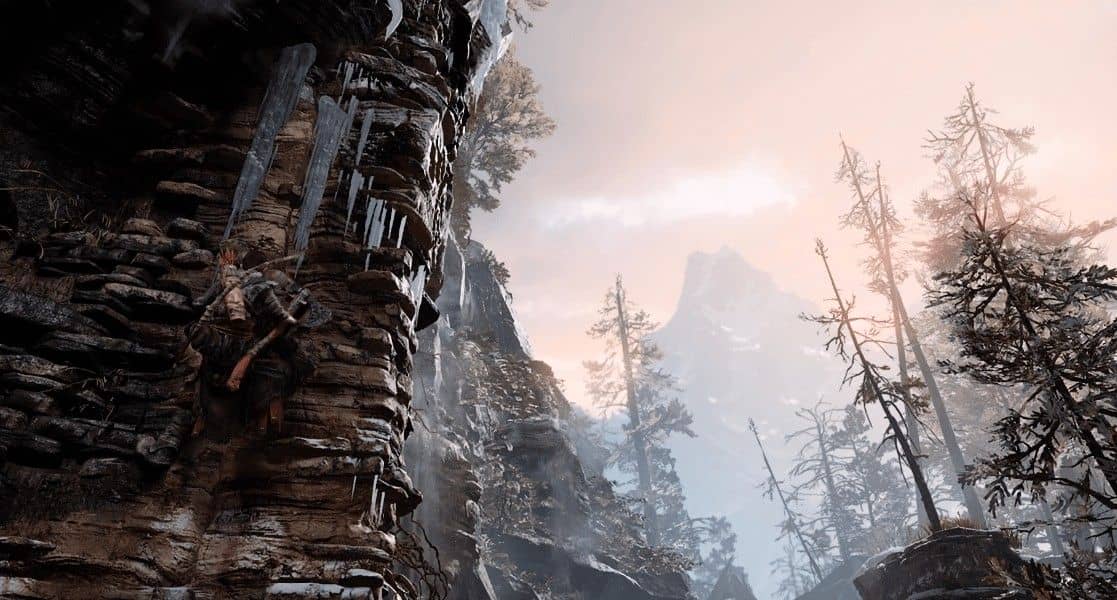
But God of War is far from just a fighting game. There are puzzles galore; just stimulating enough to be rewarding but not hard enough to be frustrating. Kratos also channels his inner Nathan Drake by scaling cliffs and mountains with Artreus clinging onto his back. Exploring each section often rewards the player with far more than just the game’s main currency, hacksilver. Useful materials and relics are dotted behind breakable walls and hidden fissures.
The beautiful game design gets the most out of each area, supplying realism and atmosphere. There may be periods of linearity but they never feel claustrophobic. New areas open as story milestones are reached, yet old ones are never closed. Nothing is unmissable and backtracking to once-locked secret chambers will yield valuable rewards, ferocious bosses, or both.
On your first boat voyage to the vast Lake of Nines, the world of Midgard, where much of the game takes place, seems overwhelming. The truth is, it’s not too big. It’s smaller than the likes of Witcher 3 and Horizon Zero Dawn. The journey will take Kratos to different realms, each distinct but none as developed as Midgard itself.
Now commonplace in open world adventures, God of War proudly includes several RPG elements. EXP earned from battles and quests can unlock and upgrade abilities but pure grinding will only get you so far. Kratos will only increase his level if sufficiently powerful gear is equipped. You have freedom to determine which sort of abilities you unlock first, and which type of armour to prioritise.
Seeing the next prospective set of skills or equipment dangles a carrot that motivates quest completion. God of War is even self-aware enough for this to be verbalised in-game. During one quest, Artreus earnestly asks why we have found ourselves completing a favour Kratos clearly didn’t care about; Kratos bluntly explains the resources gathered will lead to stronger equipment for our journey.
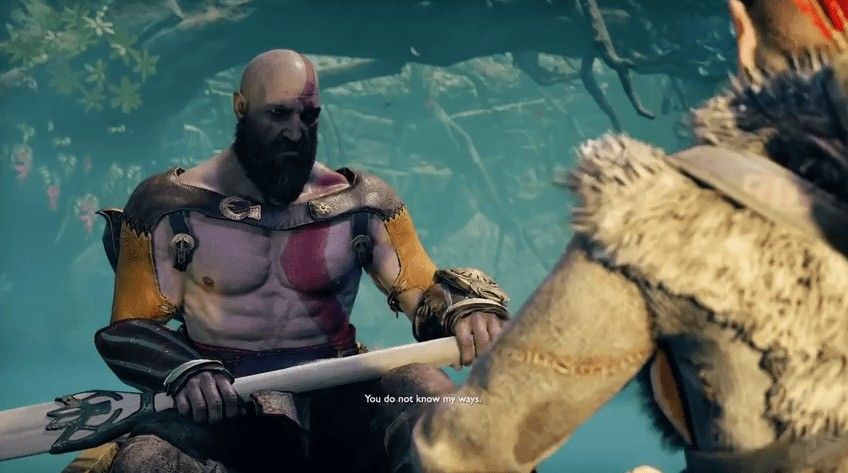
In fact, the conversations between Kratos and Artreus are a key feature of God of War. They don’t disrupt gameplay, but mostly happen during it. Artreus’ infectious excitement for their travels reflects the feelings of the player, happy to be seeing and feeling so many new things. He’s pretty useful in this regard as well, warning of an ambush or shouting out where enemies are attacking from.
Kratos isn’t always as chipper. “Boy!” he barks time and again, scolding his son with constantly harsh teachings. We often share his frustrations; after all, we are Kratos. But the dynamic is intriguing because Atreus’ perspective will feel preferable at times. Kratos’ reluctance to divulge things, fully explain his motives, or engage in any banter can cross the line of being downright cruel.
With this in mind, Kratos has at least as much to learn as Artreus. There’s an early moment where Artreus looks into the distance, lamenting his mother’s absence. Kratos reaches out a consoling hand but hesitates. He doubts whether his touch will comfort his son, or perhaps doesn’t know if this is appropriate parenting. He draws his hand back just before Artreus turns around. The relationship is complicated, and never stops growing. After all, God of War is a simple ‘father and son’ story at its core.
It’s well worth noting there is no obligation to play previous God of War games whatsoever, though hints of Kratos’ bloody past continually haunt him. Kratos fears the horrible truth will damage what little bond he has with Artreus, so hides his secrets at all costs. As the player, not knowing of Kratos’ previous exploits provides just as much dramatic tension as being fully abreast of the God of War series.
Unlike many other open world titles you won’t find an abundance of towns, settlements and NPCs. The land is vast but vacant; positively eerie at times, fitting with God of War’s pure focus on father and son. The whole world revolves around them, silent as they boat the open water except for Artreus badgering his father for stories. When Kratos finally obliges, his tales are as expected: brief, to the point, and ending with ruthless life lessons.
Nonetheless, God of War finds room to introduce a small handful of interesting characters who have their own backstories and minor story arcs. Their interactions range from meaningful to amusing. The stern, imposing figure of Kratos is perfectly juxtaposed against Artreus’ innocent eagerness to make friends and help everyone they meet, much to his father’s annoyance. There’s plenty of humour to be found in Kratos’ unrelenting instinct to threaten – even to someone upgrading his weapons for free.
The short cast list doesn’t mean God of War is cutting corners. The world’s lore is constantly expanded, either from relics found in secret chambers or stories told during exploration. By the end, you’ll know plenty of history without having to go out of your way for it.
If I’m going to be slightly critical, another settlement or two would have been welcome. There’s space for some more characters, interactions and quests. Requests typically come from the same two people, and involve a similar thing every time – exploring a tomb or cave in search of an important artifact. These are great, but compared to the depth and variety of quests in, say, The Witcher 3, there is a little room for improvement.
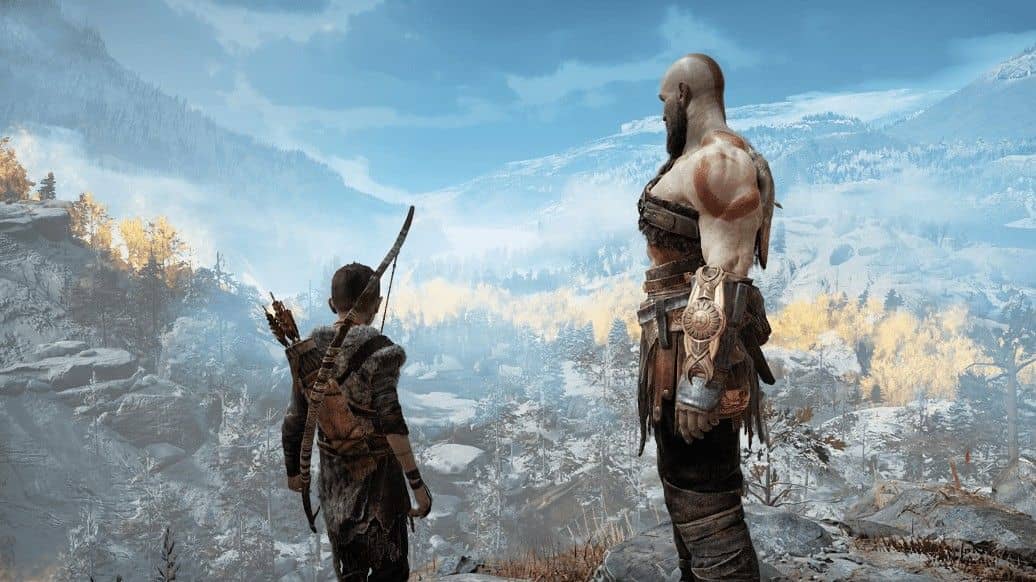
This is just a small issue in an overall experience that rivals anything on the PS4. God of War brings a lot to the table and resoundingly succeeds as a graphically supreme, action-packed, emotional journey.
You’ll get dozens of hours from God of War and when you’re done, you aren’t. There are collectibles to find, fearsome Valkyries to fight and trials to overcome. The hardest difficulty level, “Give Me God of War” cannot be switched over mid-game, requiring a new game for you to really find out how good you really are. Warning: it’s utterly brutal.
Chances are, you’ll want to give it a shot. God of War is a masterpiece, and one of the best games for years. Santa Monica aimed for the highest peak, and proudly sit at the PS4’s summit. This is not just a stellar open world title, but simply one of the best games ever.
God of War is available here, as a Playstation Hits title.


